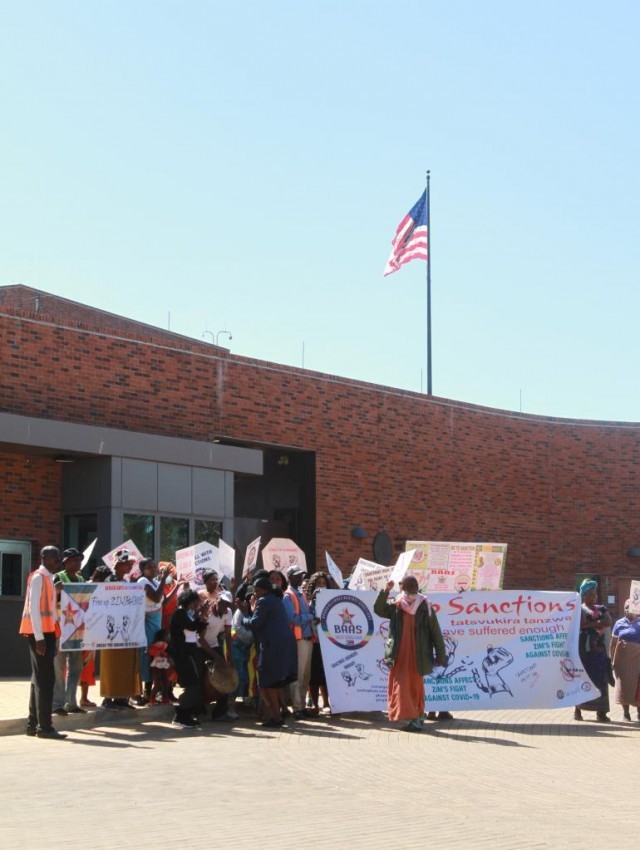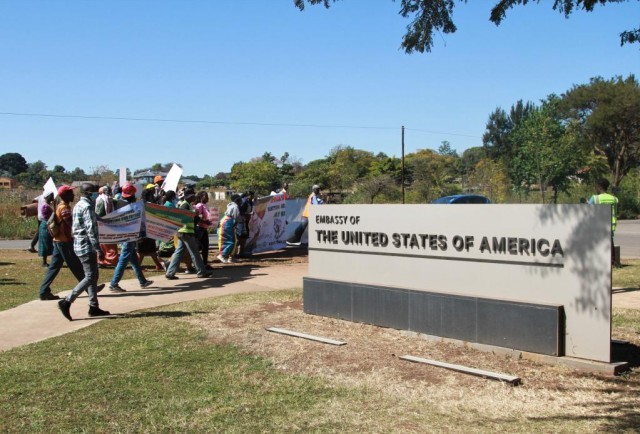Zimbabwe people protest the long -term sanctions of the United States and hit the people's livelihood
Author:Xinhua News Agency Time:2022.07.12
Xinhua News Agency, Haralay, July 11th. "If (the United States) is unlocked by the sanctions, we will leave immediately and will not stay more for a second. Otherwise, we will stay here all the time." Zimbabwe "widely opposes the sanctions alliance" " Slympown Sali Ensoni told Xinhua News Agency reporters.
Since March 29, 2019, the organization members have "set up a village" in front of the US Embassy in front of the United States and regularly hold protests to oppose the long -term economic sanctions between the United States and its Western allies to Zimbabwe.
"The United States is celebrating, it is suffering here"
The US Embassy in Zimbabwe is one of the largest and most luxurious facilities in the embassy and consulates of various countries in Timber. Opposite to the American Embassy, the two simple tents built by the "wide opposition to sanctions" are for men and women to live. A sign outside the tent reads the number of days since the tent camp was built.
There are simple furniture such as bed, table and wardrobe in the tent. Enguni told reporters that at most 52 members lived here, after the new crown epidemic broke out, the number of residents in the tent decreased. At present, 18 members live here. When regular protests are held, some organization members who can't live in the tent will come to participate.
On July 4th, the United States Independence Day is a day when the "Widely opposes the Sanctions Alliance" holds regular protests. The people of Zimbabwe gathered in front of the US Embassy, waving a verse, singing and condemning sanctions.

On July 4th, in front of the US Embassy in Haralay, the capital of Zimbabwe, Zimbabwe's "Wide Opinion of Sanctions" organized members of the "Wide Opinion Alliance" and opposed the long -term economic sanctions against Zimbabwe by the United States and its Western allies.
Xinhua News Agency (Photo Photo by Tafala Muggla)
The 48 -year -old demonstrator Jesska Fhili said that she wanted to remind the United States through her own actions that while the United States celebrated her independence day, millions of Zimbabwe people were hungry or fell into the US sanctions. poor. As a resident of a tent, she said that she would live in the tent until the United States was lifted sanctions against Jin.
Enguni told reporters that the members of the organization were aware of the people's people, especially the problems facing the people of Zimbabwe, after the sanctions of Western countries such as the United States, and decided to establish a camp here. "Sanctions are actually the main reasons for many issues in Zimbabwe. Each Zimbabwe citizen has the right to and obliges the independence and sovereignty of his country."
For 20 years of sanctions, the people are the most "injured"
Due to the historical problems of the colonial period, most of the land in Zimbabwe, especially high -quality land, was once in the hands of the white farm owner. In 2000, the Tianjin government began to implement land reform, collected the land of white farmers to state -owned, and distributed to black people. This caused strong dissatisfaction with Western countries such as the United States. On December 21, 2001, the then US President Bush approved the "Zimbabwe Democratic and Economic Restore Act". The United States has began sanctions on Jin, and it has been more than 20 years.
The U.S. Embassy reposted a statement of the US State Department spokesman Pois's speech on October 15, 2021 to a reporter from Xinhua News Agency, which represents the United States' position on the sanctions on Jinjin. Pois said that the US sanctions against Jin only target individuals and entities, and do not target ordinary people.
But in fact, the connection effect caused by this sanction is very wide. The sanctions caused American companies to do business because they were afraid of punishment, and then affected the economic and trade exchanges between Zimbabwe and other countries, and eventually caused devastating blows to the country's economy. In this process, the most "injury" is the ordinary people of Zimbabwe.

On July 4th, in front of the US Embassy in Haralay, the capital of Zimbabwe, a member of the "Wide Opinion of Sanctions" organized a protests in Zimbabwe's long -term economic sanctions against the United States and its Western allies to Zimbabwe. Xinhua News Agency (Photo Photo by Tafala Muggla)
"The most fatal impact of sanctions on Zimbabwe is to depict it as a 'bitch country'." The member of the Jindu State Peace and Reconciliation Committee and former deputy minister of the Ministry of Justice, Obert Gutu, pointed out that due to the sanctions from Western countries such as the United States, Zimbabwe It is impossible to obtain loan financing internationally. He called this sanctions "large -scale killing weapons", which caused the Tianjin government to not obtain funds to repair infrastructure such as roads, hospitals and other infrastructure. "Millions of ordinary Zimbabwe (for sanctions) cannot obtain clean water, cheap housing, infrastructure and affordable medical services."
Entrepreneurship, Entrepreneurs operating a clothing company, told reporters that she designed and produced local clothing in Zimbabwe and sold to overseas. Like other companies in Zimbabwe, receiving money from overseas customers has always caused her to have a headache. Affected by sanctions, some US payment service agencies are unwilling to have business exchanges with Zimbabwe. She can only receive money through other channels, and customers are forced to pay more costs.
There are Zimbabwe people who have lost their employment opportunities because of their own nationality. According to the Pioneer Driven, Zimbabwe national Michael Niandam Mande was rejected when he was looking for a job with Internet human resources company Andra. The reason for the other party was that he lived in a country with US sanctions.
Dengford Muta, Chairman of the Zimbabwe Retailer Federation, said that the sanctions of the United States and other countries have a devastating blow to the competitiveness of Zimbabwe's economy and local enterprises. The business environment has deteriorated, and foreign direct investment has stopped flowing in.Due to the direct and indirect impact of sanctions, Zimbabwe's economic losses have lost more than 40 billion US dollars in 20 years.According to statistics from the World Bank, Zimbabwe has gross domestic product in recent years.In October 2021, the United Nations unilateral compulsory measures on the negative impact of human rights A Lena Duhan said that the sanctions of the United States and other Western countries violated the human rights, including life rights, food rights, health, health, and other western countries.Rights, development rights, educational rights, and economic and cultural rights.Related sanctions have a serious impact on the safety and physical health of all the people, especially the disadvantaged groups, exacerbated the economic crisis and humanitarian crisis of Zimbabwe.
- END -
Studies have found that genetic technology can help astronauts diagnose disease quickly in space
Xinhua News Agency, Jerusalem July 3rd (Reporter Wang Zhuolun Lu Yingxu) The University of Tel Aviv, Israel recently released a communique that an experiment conducted at the International Space Stati
The average price index of 100 stocks in the London Stock Market "Financial Times" fell on the 16th

Xinhua News Agency: The average price index of 100 stocks in the London stock mark...